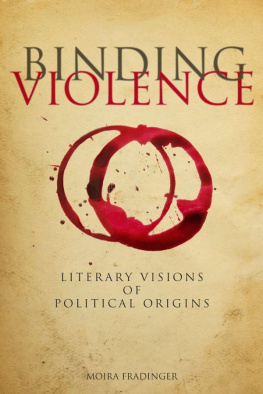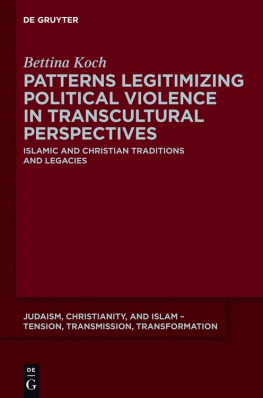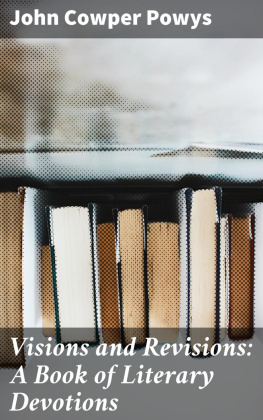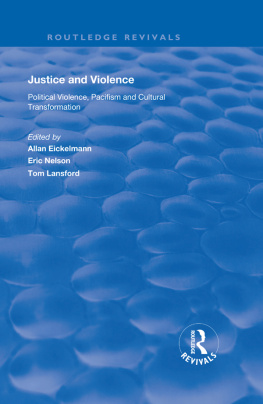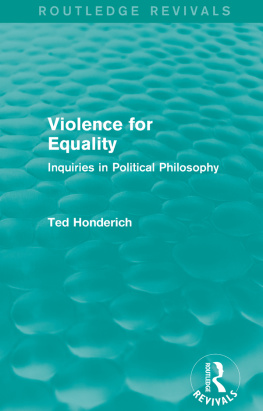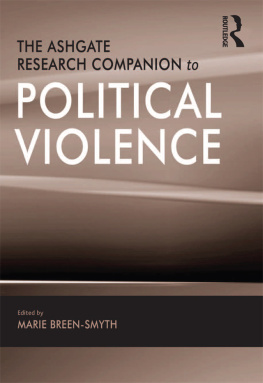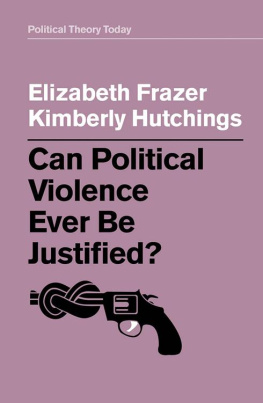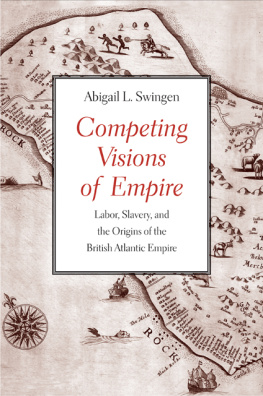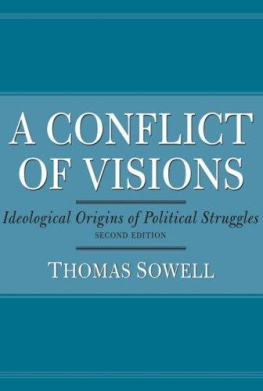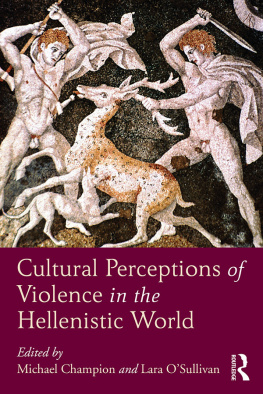Fradinger - Binding violence: literary visions of political origins
Here you can read online Fradinger - Binding violence: literary visions of political origins full text of the book (entire story) in english for free. Download pdf and epub, get meaning, cover and reviews about this ebook. year: 2011, publisher: Stanford University Press, genre: Politics. Description of the work, (preface) as well as reviews are available. Best literature library LitArk.com created for fans of good reading and offers a wide selection of genres:
Romance novel
Science fiction
Adventure
Detective
Science
History
Home and family
Prose
Art
Politics
Computer
Non-fiction
Religion
Business
Children
Humor
Choose a favorite category and find really read worthwhile books. Enjoy immersion in the world of imagination, feel the emotions of the characters or learn something new for yourself, make an fascinating discovery.
Binding violence: literary visions of political origins: summary, description and annotation
We offer to read an annotation, description, summary or preface (depends on what the author of the book "Binding violence: literary visions of political origins" wrote himself). If you haven't found the necessary information about the book — write in the comments, we will try to find it.
Fradinger: author's other books
Who wrote Binding violence: literary visions of political origins? Find out the surname, the name of the author of the book and a list of all author's works by series.
Binding violence: literary visions of political origins — read online for free the complete book (whole text) full work
Below is the text of the book, divided by pages. System saving the place of the last page read, allows you to conveniently read the book "Binding violence: literary visions of political origins" online for free, without having to search again every time where you left off. Put a bookmark, and you can go to the page where you finished reading at any time.
Font size:
Interval:
Bookmark:

In a world such as ours, where three-quarters of the population live in poverty or in the midst of war, writing about literature and violencelet alone writing is a privilege. I am indebted to many people and institutions for having granted me that privilege, and to my parents, Anamara and Ral, above all for the efforts they made to grant their children the advantage of an education.
The ideas suggested in this book are the result of so many partnerships that it is as difficult to do justice to them as it is to account for the times that led to their crystallization.
Early work for this book was done under the auspices of Yale Universitys intellectual community and with Yales financial support, for which I am most grateful. The book took its current shape partly during a postdoctoral Mellon fellowship at the Humanities Forum at the University of Pennsylvania; it was completed during a sabbatical year granted to me by a Morse Fellowship at Yale University. I wish to express sincere gratitude to the editorial board of Stanford University Press: special thanks to Emily-Jane Cohen and Norris Pope for their warmth, support, and professionalism; to Sarah Crane Newman, John Feneron, and Martin Hanft for their extraordinary efficiency, kindness, and help in the production process. I am also most grateful to Marcel Hnaff and an anonymous reader who so generously offered comments on the manuscript. A Frederick W. Hilles Publication Fund grant from Yale helped with publication costs; thanks, too, to Jon Butler and Emily Bakemeier, whose support at Yale has been vital throughout.
I benefited from invaluable comments made by many readers at different stages of work. For their advice on my early work, I am grateful to Shoshana Felman, whose lessons in reading have been invaluable, and to Roberto Gonzlez Echeverra, Michael Holquist, and Rolena Adorno. I must also express immense gratitude to Rosi Braidotti, who, in spite of not having been directly involved with this book, long ago and far away gave me a clearer idea of the kind of scholar I wanted to become. I am short of words to thank Laura Wexler for all these years of reading, support, friendship, and intellectual conversation, which made so many things possible. To have Carol Jacobs as a close reader, mentor, and friend is a privilege and a joy I could not have imagined: I cannot thank her enough for her comments on this manuscript, her unmatched intellectual generosity, her friendship, and her readiness to help, even at the last minute.
I could not have been more fortunate to have for an intellectual home Yale Universitys inexhaustible intellectual community, and especially the Department of Comparative Literature, where collegiality makes all the difference. Thanks to David Quint, Dudley and Stephanie Andrew, Katie Trumpener, and Richard Maxwell for the intellectual conversation, support, and wonderful spirit of giving, to Ala Alryyes for the friendship but also for so many rides back home when I had too many books to carry on foot; to Peter Brooks, Francesco Casetti, Rainer Ngele, Barry McCrea, Alex Beecroft, Katerina Clark, Pericles Lewis, Henry Sussman, Benjamin and Barbara Harshav, and Haun Saussy, and to Victor Bers in the Classics Department for his wonderful seminar on Greek tragedy. Michael Denning, Nigel Alderman, Geetanjali Chanda, Maurice Samuels, Hazel Carby, Jean-Jacques Poucel, and Dale Martin have been inspiring intellectual companions and supportive friends throughout. Without Mary Jane Stevenss assistance and friendship it would be hard for me to imagine Yale; thanks also for Angie Schriebers kindness and help. Geoffrey and Rene Hartmans humorous and persistent message that I should sometimes look at the good side of things always made life so much easier; they, as well as Ben Kiernan and Dori Laub, have helped shape my thinking about genocide and representation.
Many lines in this book stem from passionate discussions about politics, culture, and justice with three cherished friends at the Yale Law School whom I cannot thank enough; they made their homes a home for me. Owen Fiss and George Priest are the best of interlocutors, since they also inhabit my Argentine home; Paul Kahn, who always helps me think through the problem of violence, also invited me to his summer seminar in Germany on law and violence, an experience that had an impact on this book.
I am short of words to acknowledge the intellectual inspiration and friendship of newer interlocutors: Fred Jamesons questions made me reconsider several passages and several other problems for a future inquiry on violence: his intellectual vision, critical passion, and generosity of heart and mind are unparalleled. John Beverley encouraged me to publish this book after reading a summary of it. Thanks for Susan Williss wonderful insights and generosity; and to Ariel Dorfman, whose spirit of giving, political and literary writing, and limitless enthusiasm for life inspire me constantly. Special thanks to Gerry Prince for encouraging me to publish an earlier part of my work on Sade in French Forum (Riveted by the Voice: The Sadean City at Silling, French Forum 30.2 [Spring 2005]: 4966); thanks also to Shane Herron and Sol Pelez for publishing an earlier version of my thoughts on Antigone in Theory@Buffalo (Violent Boundaries: Antigones Political Imagination, Theory@Buffalo , Issue: Democracy and Violence [Spring 2006]).
It is true that one always writes in a foreign language: our mother tongue is at first alien to us, and then one struggles with written language as something alien to the native oral idiom. Nonetheless, writing in a language that is not ones mothers tongue has entailed more hours of mourning for me: one mourns metaphors that have the sound of music in ones mother tongue but do not make the least sense in English; one mourns those fictions that made reality livable while growing up and that one cannot imagine in a language other than that of ones childhood; one misses tones, emphases, concepts, and ways of perceiving that have no translation. It would all have been impossible without the support of friends here, at home, or scattered all over the world. My biggest thanks to sisters in the United StatesNadia Altschul, Kamari Clarke, Sara Nadal-Melsi, and Ana Pugawho not only read my work critically but with whom I also share the travails of uprootedness within and beyond the academy; special thanks to Leo Lisi and Olivier Reid, who read the entire manuscript with incredible patience, critical insight, and eye for detail. Thanks for the friendship of Joel Tolman, Cecilia Enjuto-Ranjel, and Pedro Garca Caro, who also offered invaluable help for last minute problems; thanks for Erik Butlers wicked sense of humor and expertise in classics; and to Elizabeth Tulis, Catherine Flynn, Sonya Collins, and Tobias Hetch for help at different stages with editing. Thanks to Marta Rivas and Jorge Santiago, and Julie and Krimo Bokreta for so many meals in Philadelphia, and to fellow travelers Mara Willstedt, Masha Salazkina, Luca Caminati, Fernando Rosenberg, Amy Chazkel, Pepe Crdenas, Kate Holland, Duncan Chesney, John Charles, Patricia Gherovici, Gustavo Klurfan, and Marc Caplan.
Having lived in seven different countries means that home is mainly created by the friends one meets along the way. Shared nomadisms with friends of friends have been vital throughout: enormous gratitude goes to Seema Kazi, Elizabeth Janz Mayer-Rieckh, Marcos Mario, Araceli Varela, Ariel and Adriana Mndez, Sylvia Ppoli, Sylvia Mitraud, Vladimir Flrez, Miguel Rojas, and Philippe Skolle; and a debt is owed to an old friend, Gustavo Guerrero, who long ago, in Caracas, showed me a different entrance to poetry through the modern Greeks. Buenos Aires, though, is still the city where the unfailing loyalty of old friends anchors and revivifies me. Thanks to Kuky Coria and Mariano Plotkin for insisting that I take the plane to come to Yale; to Elena Allo, Andrea Tolchinsky, Mirta Clara, Miriam Wlosko, and Debora Yanco for their constant help and wisdom; to Jorge Myers for always going out of his way to share his boundless knowledge; to Francisco Naishtat for his insightful reading of a chapter; to Pablo Kreimer and Gabriel Guralnik for their unbeatable sense of humor in the face of catastrophe; to Laura Klein, Silvia Chejter, Gerardo Gutman, Mercedes Etchemendi and Marcelo Ferrante, Eduardo Abbate, July Chneton, Viviana Matta, Anah Valent, Miguel Wald, Itat Acua, Judith Filc, and Peter Kahn for being there at crucial moments; and then there is my old debt to Pablo Pavesi, for helping me long ago to find my roots in literature.
Font size:
Interval:
Bookmark:
Similar books «Binding violence: literary visions of political origins»
Look at similar books to Binding violence: literary visions of political origins. We have selected literature similar in name and meaning in the hope of providing readers with more options to find new, interesting, not yet read works.
Discussion, reviews of the book Binding violence: literary visions of political origins and just readers' own opinions. Leave your comments, write what you think about the work, its meaning or the main characters. Specify what exactly you liked and what you didn't like, and why you think so.

